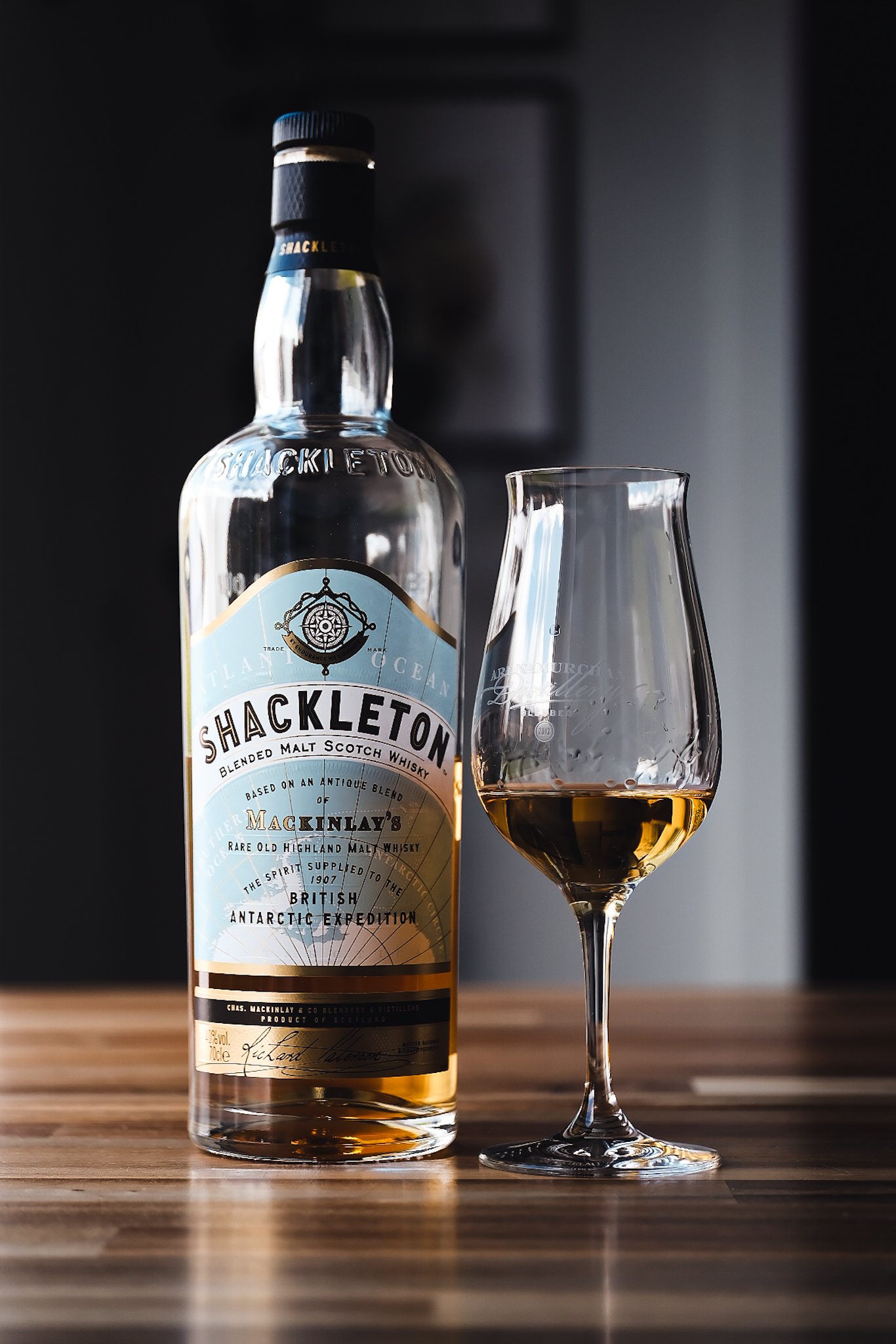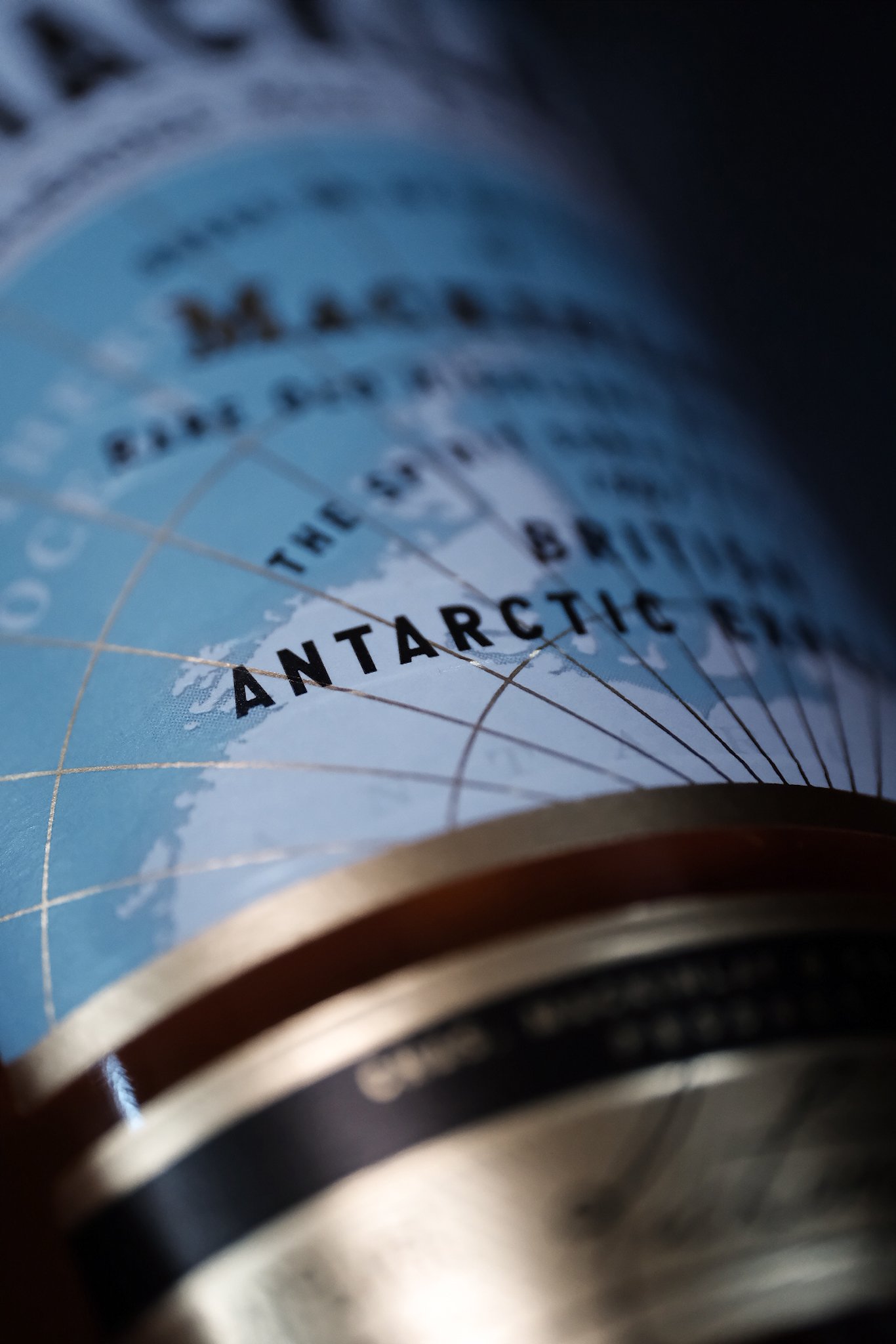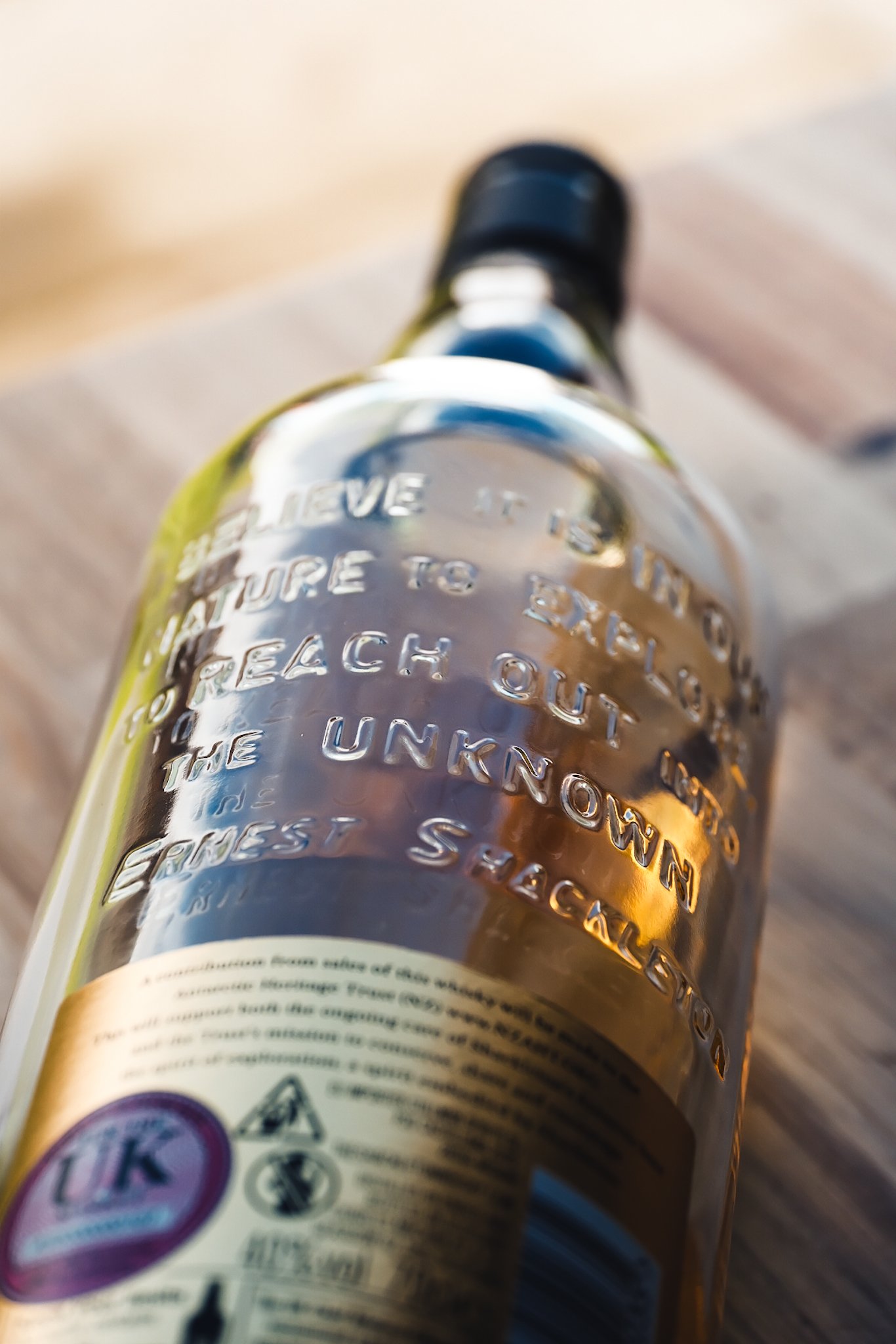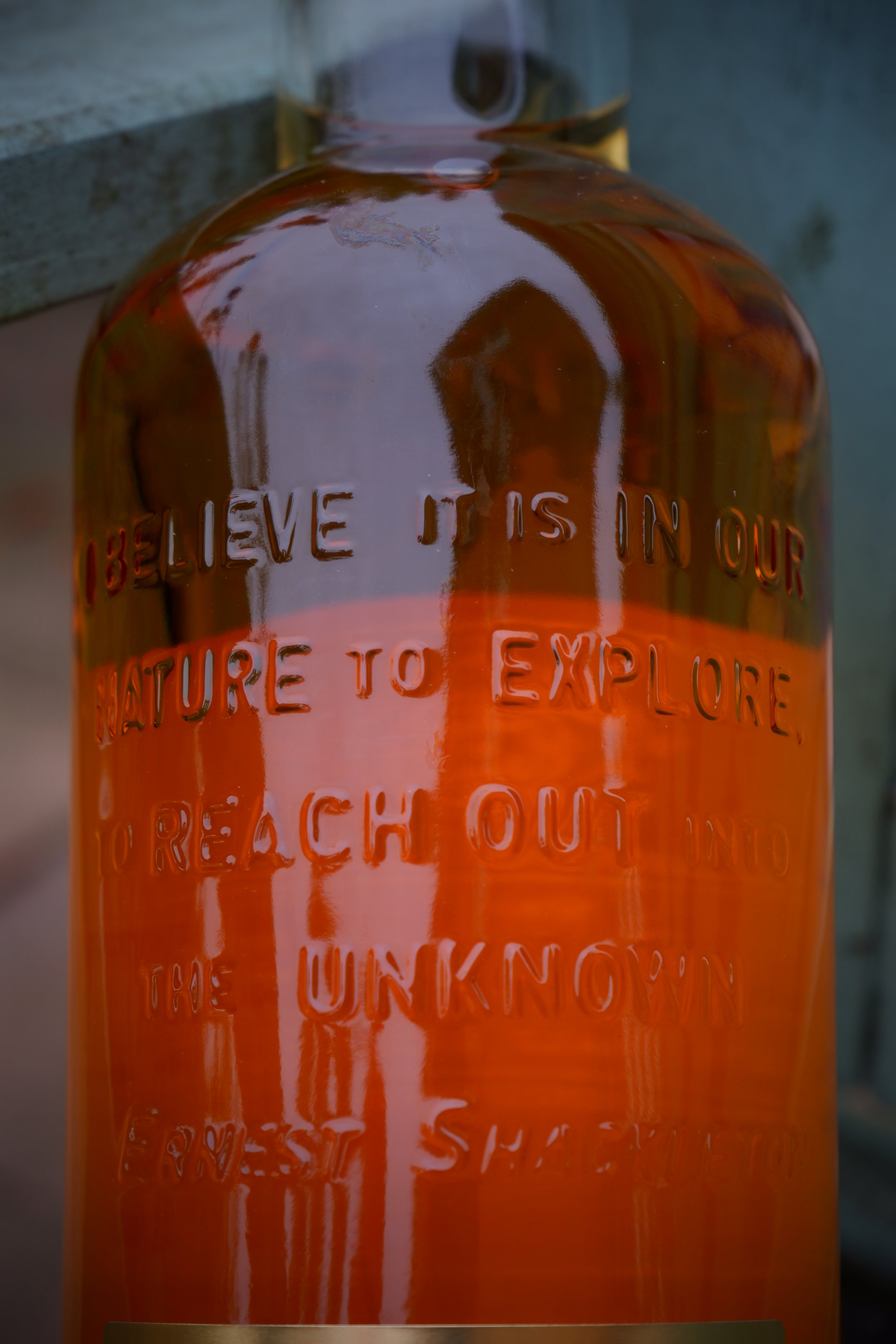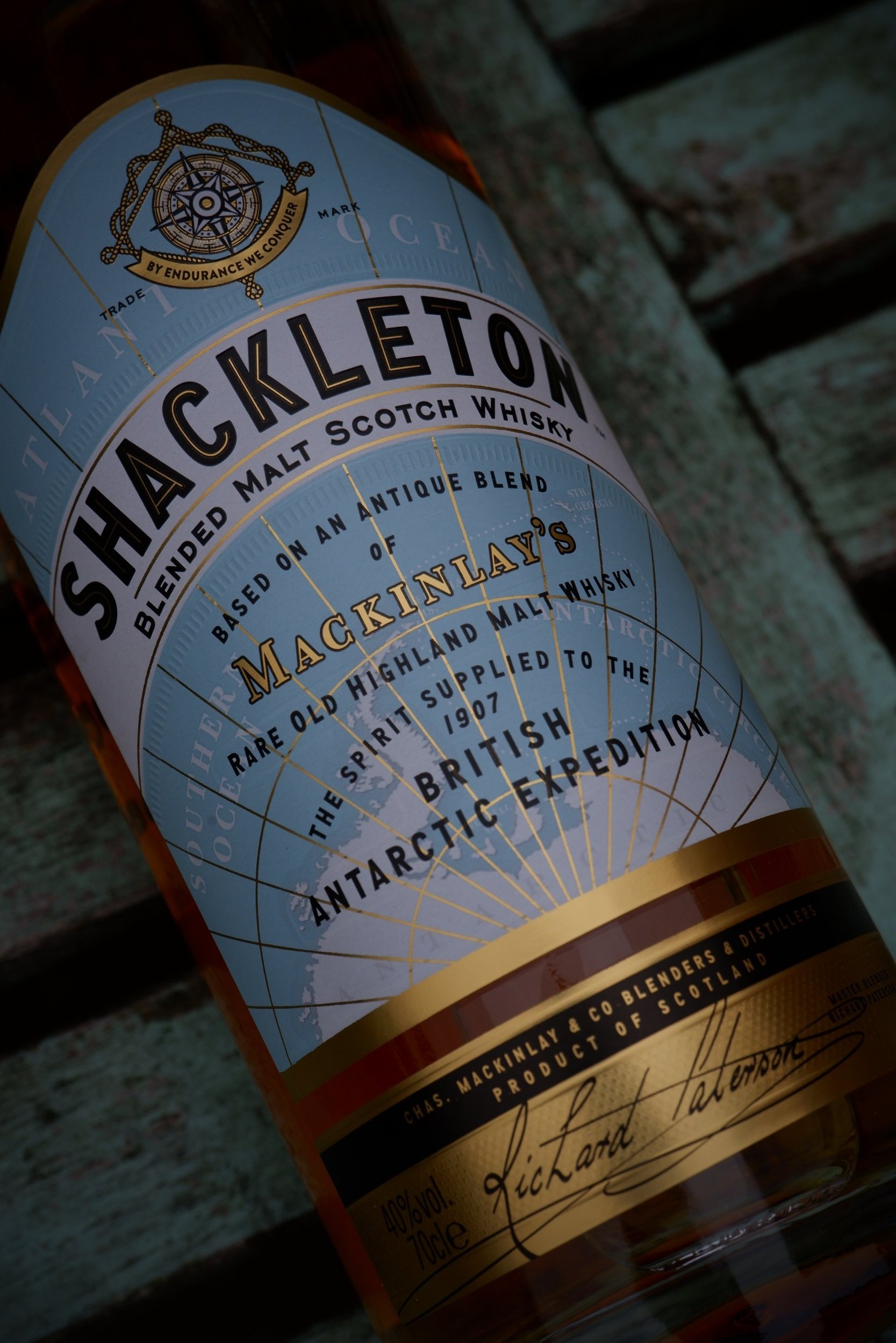Mackinlay’s Shackleton 2023
Blended Malt Scotch Whisky | 40% ABV
Score: 6/10
Good stuff.
TL;DR
Good whisky, missed branding opportunity
We’re very slick
A short anecdote from Wally to open this one. I hope the team involved in this piece won’t mind, it’ll be a nice little surprise for them.
Multitasking remains tricky for me and completeness is something I admire and strive for, but it’s often an area I inevitably falter. My skills of having my head in more than one space at the same time needs a little work, to say the least.
So, with my bag of whisky projects sagging, stretching and bursting like a flimsy, biodegradable supermarket bag, some things occasionally fall out and are left on the path behind.
One of these was our Dramface Review Tracker. A mighty document critical to the inner workings of Dramface and integral to the ‘write anything you like’ doctrine. It’s an important thing indeed. Not for public eyes, it documents everything we do and keeps everyone on track of what’s ahead, what’s work-in-progress and what’s gone before. It’s become an excellent data mine and a core foundation for the flow of content.
The team recognising the Wally neglect, stepped forth to keep it tidy, concise and up to date. I’m deeply grateful, the pleasure of opening it and seeing it bang-up-to-date without fail is a beautiful thing that warms my cockles and reminds me of how cool our team are.
Yet occasionally, like any process, it fails. Like the time Broddy and Dougie decided to work on this exact same whisky at the exact same time. After they’d both written their preambles, it was discovered. It was agreed that I would complete the review while Dougie hopped in his bonnie boat over the sea to Skye, probably rinsing his bottle en route. Thankfully, not before leaving us with the typically gorgeous signature images you see here.
So, happily, we’ve ended up with a collaboration that’s a nice serendipitous accident. What’s really quite reassuring and lovely for the fuzzy-headed Wally though, and I believe a complete surprise to my partners in crime, is that Logan and Dallas reviewed this for Dramface last year.
Still, just as if they’d reviewed it as a four-way collaborative in 2022, what we have here is still valid to share. Arguably, in 2023, it’s even more worthy.
We pick up with their own copy for your daily Dramface delight…
Two takes on a blended malt
Bit of a different format here. Both Dougie and I had put this one up in our review tracker as an ongoing review. Fast forward a couple months and many life hurdles, including Dougie's upcoming relocation of the Isle of Skye, and this one has been shuffled off for one reason or another.
So, with us working in isolation in the midst of our busy lives outside of whisky, we both ended up with a preamble. And not wanting to waste our own words or our connections to this whisky, we have a double-header.
I first stumbled across Shackleton in my research and co-authoring of a feature of four Octomores with our technician Tyree, discussing the impact and terroir of peat on the flavour compounds that end up in our glass. I was intrigued by the history of the Shackleton. To paraphrase myself here, after I paraphrased a paper by James Pryde (2011):
“In 2010, an expedition was launched to recover three cases of Mackinlay’s Rare Highland Malt Whisky, buried under the Antarctic ice covering Sir Ernest Shackleton’s 1907 expedition base camp. Three bottles were returned to Scotland, showing incredible preservation for their time spent frozen in the tundra. The corks and seals were in incredible shape, with all three bottles showing the same level in the bottle and a 47.2 %ABV. These historical whiskies were subjected to a battery of human sensory trials and chemical analysis.
While the sensory trials detected a lightly peated whisky by the panel, the chemical analysis found a 3.5 ppm phenol content in the whisky. Going one step further and leveraging the geographical peat profile research, it was determined that the peat was very likely sourced from Orkney, confirming the historical records that the peat was sourced from the Isle of Eday. Science confirms that at a time where heavily smoky whiskies were the norm, Mackinlay’s was bucking the trend and producing a lighter peated style of whisky in the early 1900s and the chemical analysis could confirm the unique profile of the peat used in the malting process.”
Obviously these rare and preserved bottles will be virtually impossible to replicate today. Yeasts have mutated, barley has been refined, stills are now steam-powered compared to direct fired, fermentation is now tightly controlled, cut points are now accurately measured compared to the manual stillman’s senses, and other various factors but you get the point. And given the rarity of the recovered whiskies, we are left with a good story but an inability to verify if this new blend even comes close to the original.
Let’s have Dougie’s take on what drew him to this blended malt.
The sea, she calls
I’m drawn to nautical things like Wally is drawn to Speyburn 15, which is to say that I instinctively grab it, without second thought.
Over the course of my adult life I’ve come to genuinely love the sea, which is odd considering I have an unshakable fear of deep water. I don’t mean 10 metres of swimming pool or even 10 metres of sandy bay. I mean the 100 metres of open ocean. I don’t mind sailing above it. I don’t mind looking at it. But if I ever were to be thrust into the icy depths I would just give in and succumb rather than endure bobbing about.
It’s not knowing what's beneath that messes me up - is there a shark ready to bite my lower half off? Is there a submarine about to spear me on one of its radar sticks and drag me two thousand leagues under the sea? Is there a jelly fish ready to wrap its globulous form around my hands and make me shriek like a bandsaw?
None of those things would likely happen and I’d be just fine, but the mind plays funny tricks. Regardless, my love for the marine world has permeated every facet of my life such that whenever I see a lighthouse or a haggard fishing boat or a beautifully rigged sailing yacht I have to stop and admire it. Nautical chandlery, winches, blocks, ropes, helms and even stripy t-shirts have me swooning. But flying well above all these are the tales from the annals of history about the sea, about sailors and adventurers, and the inexorable desire to explore the seas, find new lands and expand our horizons.
Just up the road from where I live is Dundee, the City of Discovery. On the main drag along the seafront, overlooking the River Tay rests a large, wooden vessel with complicated rigging and towering wooden masts. One might liken it to a wooden galleon or some other Master and Commander type ship, but in reality it’s one of the last wooden three-masted Barque-rigged ships ever made. It was built to the blueprints of a whaling ship but was constructed and adapted specifically for scientific research, launching into the Tay, from where it was constructed at Dundee Shipbuilders Company in 1901. Named Discovery this ship would soon set sail for the relatively uncharted, mythical place at the very bottom of the earth: Antarctica.
Comprising a crew of some defacto heroes of the time, the RRS Discovery sailed towards the Antarctic without the traditional shakedown tests demanded of these ships, meaning that most of the foibles and issues were worked out en-route to the South Pole. The crew of 48 men included Captain Robert Falcon Scott, he of valiant Terra Nova Expedition who would journey several years after the Discovery Expedition into abject misery, watched his team fall away into death and despair after discovering that the Norwegians had pipped them to the pole by less than five weeks. Other crew for the Discovery Expedition included Scotsman and navigator Albert Armitage, born in Balquhidder; Edward Wilson and Edgar Evans, both who went on with Scott to join the Terra Nova Expedition, and Major Sir Ernest Henry Schackleton, third Officer and principal entertainment arranger. This time period, where crews of men would journey into the unknown and discover new worlds, was called the Heroic Age of Antarctic Exploration.
Shackleton would dip out of the Discovery Expedition early on account of ill health but carry on to launch the Imperial Trans-Antarctic Expedition, failing to reach the pole when his ship, Endurance, was crushed to bits by the Antarctic ice, forcing him and his crew on a treacherous 720 nautical mile voyage to Elephant Island. Returning to the pole years later, on the Shackleton-Rowett Expedition, he succumbed to a heart attack whilst moored in South Georgia. A true hero of his era he brought new perspectives to the world through the spirit of adventure.
When I first started this review our lives were continuing on their merry trajectory. I’d just arrived back from sailing to Campbeltown and my uncle gave me this bottle to take away - he wasn’t taken with it. I popped it open and was surprised by its complexity for a 40% whisky, and how it reminded me of Maclean’s Nose a wee bit. I spent a few nights dramming this and considered it a pretty good blend, enough to make me want to write a review about it, and the preamble above is testament to my approach. However my neglect for it soon reared its ugly head, and before I had a chance to write comprehensive notes, I’d moved on to other things (Ardnamurchan Sherry Cask) and then our decision to move to the Isle of Skye has put a massive wall between me and whisky writing (for now). The spirit of adventure has the tendency to put a lot of things on the back burner.
As such I haven’t completed this review, rather left it in limbo, stuck in the ice floe. Frozen in time. Broddy has been gently whipping me with the cat-o-nine-tails to get my fat fingers moving, but I’m being ripped from sheet to sheet here and struggling to keep my feet. From Broddy’s tasting notes I see it’s remarkably similar to what I recall mine being. But I can’t check because, in the purge of 2023 to avoid having to haul 220 miles to the new house, bottles with heels remaining or bottles I’ve decided I no longer need, I gave away to my new-to-whisky pal…including the Shackleton, and he’s only gone and rinsed it. An oversight I grant you, but such is life. So I leave you to Broddy to head up the charge and offer my apologies for dereliction of duty.
I’ll make it up to you, I promise…
Review
Mackinlay’s Shackleton, Blended Malt Scotch Whisky, 40% ABV
£35-ish, often on offer for much less. CAD$40 (£23) paid.
The backstory here was enough to pique my interest from a technical perspective but at RRP, I wasn’t willing to take a punt on this blend two years ago. But, given the ever increasing whisky prices since 2021 and the lack of price movement on the Shackleton in my area, I snagged a bottle or two to test the waters.
And tested I have, in cocktails, neat, ice on a hot day, and with friends.
Score: 6/10
Good stuff.
TL;DR
Doog and Broddy agree on the score. Good whisky, missed branding opportunity
Nose
Light honey, barley sugar, barley grist, hot grain dust, sawn oak, and a touch of green apple. It’s light and inoffensive and doesn’t have some of the annoying grain whisky prickle that can sometimes be found with other blended whiskies (I’m looking at you Mr. JW).
Palate
Runny honey, buttery biscuits, green and red apple medley and vanilla. The faintest whiff of smoke on the trailing half of the experience. A pop of citrusy lemon too. There is a dash of white pepper, which when combined with the citrus, comes across as a zestiness. There is a nice touch of sweet and sour interplay between the honey and lemon. Coming back to this whisky after a few others and some barely ripe bananas fleetingly pop up and then disappear. Interesting how our senses play little tricks like that on us. It does come across as somewhat young which is to be expected, but it is not overly jagged, a display of the quality of the malts heading into this blend and the blending prowess of the team.
The mouthfeel is significantly better than most 40% ABV drams out there, with a lightly buttery or oily mouthfeel that exceeds the more watery mouthfeel of other entry single malts. The finish is clean and short.
The Dregs
The long and short of it: it’s a blended malt whisky that isn’t mind blowing in complexity but it is quality.
I would put this blend toe-to-to with the likes of Glenlivet 12, Glenfiddich 12, and AnCnoc 12 and it would almost always come out on par - or on top - from my perspective. The addition of the lightest lick of peat elevates this whisky above the others in my opinion.
But don’t take this recommendation just from me. Upon the Shackleton going on sale at $40 CAD (£23) from its regular $65 CAD (£38) RRP in my area, I suggested to my friend group that they should head out and grab a bottle based on the price vs. quality ratio. A few didn’t take the bait due to full shelves while a few snagged a bottle to try, trusting my recommendations on a non single malt purchase.
Well did I nail it. Within a day of buying the first bottle and cracking it that night, my friends purchased four-six bottles each, stating that for the price it was such an easy drinking whisky that didn’t have any drawbacks. When it’s good, it’s good and we should all pounce when opportunity arises.
This is one of those scenarios where it is a 5/10 whisky but given the typical “sale” prices, which are more akin to regular prices given the frequency and length of these discounts, I’m going to give this a 6/10. You just can’t go wrong.
for a little garnish, we add some of Dallas’s unused images from last year’s review from Logan.
And to tie this back into my own preamble, I feel there’s a missed opportunity by the people at Mackinlay’s. Their backstory is one of history and exploration yet I feel that’s where it ends.
We don’t have much in the way of confirmation from various industry people that the new whisky, despite sharing a name, even somewhat resembles the original blend. They have obviously released the Shackleton at a lower ABV than the three bottles that were tested, missing the mark from a historical perspective. But despite the slight mishandling of the marketing and the whisky’s bottling strength, it’s still good and I won’t fault it, especially when I find it at a deep discount.
Score: 6/10 (Doog’s score is also a worthy 6/10)
Tried this? Share your thoughts in the comments below. BB / DC
-
Dramface is free.
Its fierce independence and community-focused content is funded by that same community. We don’t do ads, sponsorships or paid-for content. If you like what we do you can support us by becoming a Dramface member for the price of a magazine.
However, if you’ve found a particular article valuable, you also have the option to make a direct donation to the writer, here: buy me a dram - you’d make their day. Thank you.
For more on Dramface and our funding read our about page here.
Other opinions on this:
Got a link to a reliable review? Tell us.

